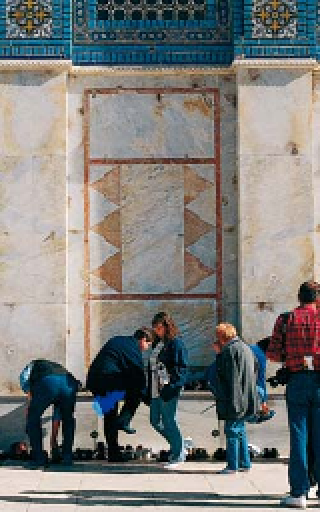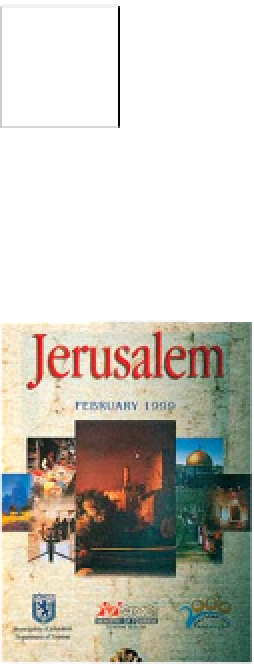Travel Reference
In-Depth Information
Tips for Tourists
Tourism in Jerusalem and the Holy Land
is considerable, given the region's major
historical and religious importance, as well
as its great natural beauty. As such, most
towns are well adapted for visitors, with
good public facilities and helpful tourist
offices. Major sites are open long hours
for much of the week, and also have good
facilities as well as useful educational material. Some sites,
however, are well off the beaten track, and difficult to
reach using public transport. If visiting desert areas, make
sure you arrive early, to avoid the extreme afternoon heat.
Israeli tourist
office sign
Free brochures
available from tourist sites
sites, other than the churches,
are open on Saturdays but
closed on Sundays.
In Jordan the main sites
(including Petra and Jerash)
are open daily, but other,
smaller sites, including many
of the museums, are closed
on Tuesdays. From around
October to March (considered
the winter season), most sites
in the Holy Land close an
hour earlier than usual.
ENTRANCE FEES
Most of the historic and
archaeological sites in
Jerusalem and the Holy Land
have some kind of admission
charge, although some smaller
churches and mosques have
no fixed fee at all. In these
cases a small donation is
customary. Prices are generally
very reasonable, with most
minor sites in Israel charging
only a few shekels. Larger
places may charge slightly
more, with the most expensive
site to visit by far being Petra.
In Israel you can purchase a
14-day Green Card for around
NIS 120, that gives free access
to all sites under the control of
the Nature and National Parks
Protection Authority. These
are mainly natural and more
minor archaeological
sites, but if you are
planning to spend
some time sightseeing
in Israel, this may be
a good investment.
WHAT TO WEAR AT
SACRED SITES
When visiting holy sites
such as churches,
synagogues and mosques, it
is essential that you dress
appropriately. This means that
your arms and legs must be
fully covered; shorts or short
skirts and sleeveless tops are
not acceptable. At certain
Free tourist office brochure
TOURIST INFORMATION
As well as providing useful
information in the form of
free brochures and maps,
Israeli tourist offices are
usually able to help with
other matters, such as finding
accommodation and arranging
transport. In smaller towns, or
at archaeological sites, the
tourist offices are of more
limited use, and information
is usually confined to the
immediate area. The Autono-
mous Palestinian Territories
are also in the process of
organizing a network of
information bureaux, but for
the present, their sole office is
in Bethlehem.
In Jordan the only tourist
information offices are in the
main tourist destinations such
as Amman, Petra and Jerash,
while in Sinai there are no
tourist information offices at
all. All three countries have
international tourist bureaux,
however, which you can use
before you leave. The national
airline offices can also often
help with travel information.
OPENING HOURS
Because of the
many religious
holidays
(see pp36-9)
celebrated in the
region (Jewish, Muslim
and Christian), open-
ing hours for the many
tourist sites and historic
monuments can vary
greatly. As a general
rule, however, sites
in Israel are usually
open daily, except for
Friday, when they
keep more restricted
hours, and Saturday,
when they are closed
altogether. Christian
Visitors removing footwear before entering
The Dome of the Rock, Jerusalem




















